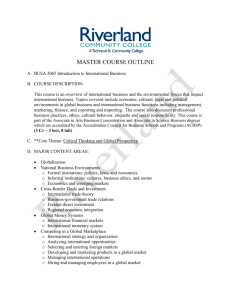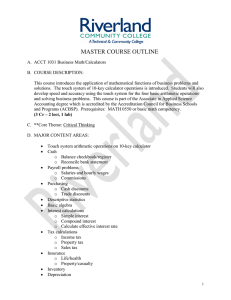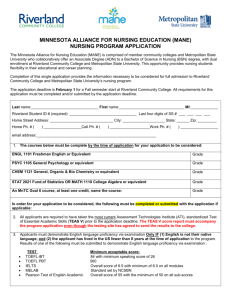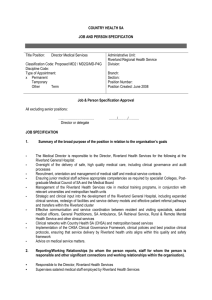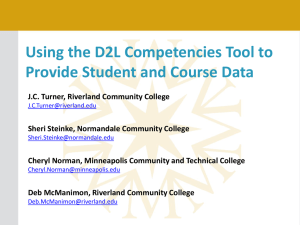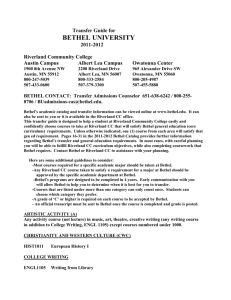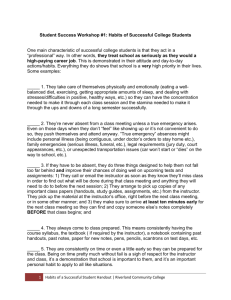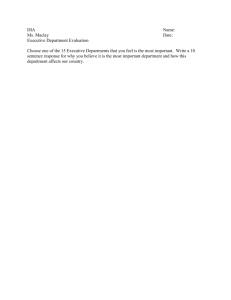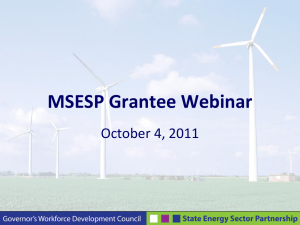Providing an Extraordinary Education – Minnesota State Colleges
advertisement
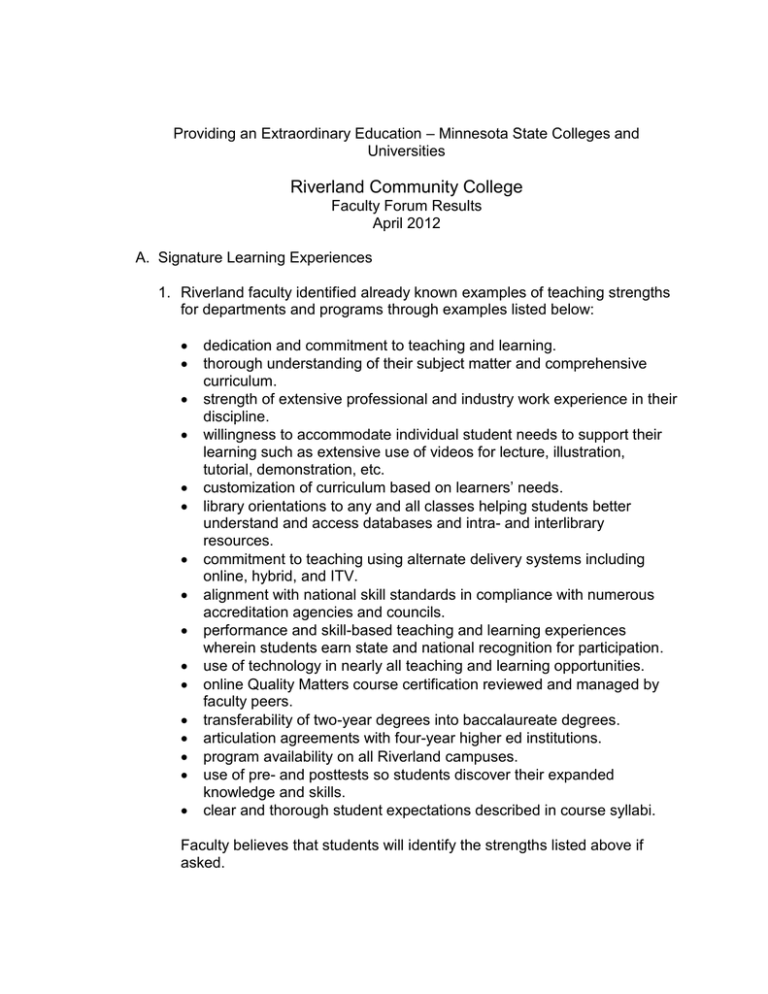
Providing an Extraordinary Education – Minnesota State Colleges and Universities Riverland Community College Faculty Forum Results April 2012 A. Signature Learning Experiences 1. Riverland faculty identified already known examples of teaching strengths for departments and programs through examples listed below: dedication and commitment to teaching and learning. thorough understanding of their subject matter and comprehensive curriculum. strength of extensive professional and industry work experience in their discipline. willingness to accommodate individual student needs to support their learning such as extensive use of videos for lecture, illustration, tutorial, demonstration, etc. customization of curriculum based on learners’ needs. library orientations to any and all classes helping students better understand and access databases and intra- and interlibrary resources. commitment to teaching using alternate delivery systems including online, hybrid, and ITV. alignment with national skill standards in compliance with numerous accreditation agencies and councils. performance and skill-based teaching and learning experiences wherein students earn state and national recognition for participation. use of technology in nearly all teaching and learning opportunities. online Quality Matters course certification reviewed and managed by faculty peers. transferability of two-year degrees into baccalaureate degrees. articulation agreements with four-year higher ed institutions. program availability on all Riverland campuses. use of pre- and posttests so students discover their expanded knowledge and skills. clear and thorough student expectations described in course syllabi. Faculty believes that students will identify the strengths listed above if asked. 2. Riverland faculty identified what it would mean for their department/program to be known for its “signature learning experiences” and plan how project-based, active, or problem-based learning might be used more widely in the department/program. The following examples of learning that actively engage students are: project based learning; hybrid formats, with a scaffolding instructional strategy culminating in a standard competency being demonstrated by the student. theatre productions, musical programs and visual arts exhibits offering students hands-on learning opportunities with college and community groups while showcasing their learning. data workshops and field activities. community expert presentations in the classroom. capstone assignments through the use of e-folio. assignments that connect each student with relevant and individual learning experiences. writing center seminars/workshops for students needing additional help. collaborative teaching model with Adult Basic Ed offering an additional instructor in the classroom assisting the college faculty. flipping the classroom experience – lecture done as homework and assignments done in the classroom with the support of the instructor. linking dedicated tutors and counselors with the faculty to enhance student performance and success. experiential and service learning in the community and public schools. laboratory or lab-like experiences. students across disciplines participate in annual disaster simulations. 3. Riverland faculty explained other ways to redesign the classroom experience as follows: pilot the flipped classroom model wherein lectures are done as homework and class assignments are done in the classroom with the help of the faculty. increase involvement with secondary educational partners. increase online options with Quality Matters certification as a standard. explore enhanced hybrid delivery models. experience-based learning such as music majors teaching music lessons to students unable to afford them. add more video lecture to online and hybrid classes. one-on-one conferences to create experts on peer editing – each student has an expertise they use in the peer editing process. assign more writing for students to improve on what may be an eroding student skill. 2 enhance and offer more outside field trips to provide an enriching and relevant student experience. incorporate a lecture capture system into an online class for students to record at home to complete an oral presentation. 4. Riverland faculty identified steps the department should take to increase student engagement with learning, improve pedagogy, and increase the efficacy of our faculty. They described what can be done with existing resources and what additional resources (whether technological, financial, or other) would be optimal. They examined ways in which they could work with other programs, departments or institutions to be more effective. Results listed: need financial support to improve the infrastructure of the Bridges Theatre such as renovating seating area, addition of fly space, improvements in the work and house lighting and safety improvements. streamline the present purchasing process through an online system. group tools in D2L, cross discipline collaboration on projects such as auto service, diesel, wind and solar. collaborate with programs across the college on a student recruitment process. use Malcolm Knowles’ work in developing andragogy as a strategy for working with adult learners. implement more D2L tools such as the Rubric tool to provide immediate feedback for students and the attendance tracking tool to assist in reporting chronic attendance issues to counselors and financial aid staff work with other programs to develop world language classes applicable to their discipline. take the classroom into the world in the form of class trips. co-teach with other faculty from other disciplines. develop learning communities. enhance opportunities to dialog between students and faculty in trying to find ways of improving students learning. institute a required, college-wide first-year experience course. expand opportunities for professional development for faculty study how to predict and then improve retention and student success using Echo360 lecture capture/blended learning environment. offer consistent lab assistants to free faculty from the time-consuming ordering of supplies and equipment, maintaining equipment, choosing and modifying or writing lab exercises, assessing material, setting up labs, breaking down labs and cleaning up. 3 B. Learning Outcomes 1. Riverland faculty identified the capabilities and competencies they expect students to have when they graduate from their department/program as follows: meet requirements for state registry’s standards identified by national accrediting body. Gain general knowledge and high physical aptitude. Attain skills identified by industry and required for entry level employment into specific program related occupations be adept at searching library holdings – physical and electronic – and further evaluate resources for accuracy and correct usage. gain competency relevant to respective course outlines’ objectives and outcomes to include college’s core themes of critical thinking, human diversity, global perspective, people and the environment, and ethical and civic responsibility. gain critical thinking skills and the ability to problem solve and improvise under pressure. function positively with diverse groups of people. effectively develop a work ethic for the profession. develop an understanding of the creative process and its application in the world. develop an understanding of the role of a world citizen. understand the scientific method of inquiry into science-related questions and issues. transferability of courses and degrees to universities. 2. Riverland faculty listed the data we already have about learning outcomes and how we use them. They have identified ways in which to review the following outcomes data to improve learning: organizational performance data, student evaluations, exam pass rates, and competency skill assessments. benchmark data using various data sources. survey results to identify issues and continuously improve. analysis of student learning improvement plans and results to assess learning outcomes. state and national student competition rankings. analysis of retention rates in courses. administer pre- and posttests to adjust teaching techniques and identify students’ needs. analysis of graduate exit surveys. 4 3. Riverland faculty identified improvements relevant to learning outcomes data or assessment practices to better assess what students learn in our department/programs as follows: add national certification exams and additional employer surveys. collaborate more with faculty from other disciplines. develop course exit examinations. organize peer evaluations to identify how to improve teaching methods. administer class surveys at beginning and end of classes. C. Curricular and Course Collaboration 1. Riverland faculty identified ways in which new collaborations could make courses better and our work more productive and enjoyable. Ideas on how we increase collaboration within the department, across the college or university, or across the system to create and share the courses and materials are listed as follows: schedule time to meet, collaborate, and plan department meetings. negotiate statewide articulation agreements. offer continuing education credits for workshops and coursework. plan team teaching across disciplines to facilitate learning. collaborate with Student Success Center and the Writing Center. develop an emphasis on building student writing, research and argumentation skills to benefit all departments. collaborate with our neighboring colleges to share best teaching practices and partner on curriculum and program offerings. sustain parent help centers presently funded by MDH which focus on young male parents and fathers-to-be based on emerging research that shows colleges must prioritize productive out-of-class engagement among men. The centers will also provide outreach and services that have a strategic focus on three student groups: online learners; young student fathers or soon-to-be fathers; and health science/nursing majors. State and national data support these focuses. form advisory committees that include four-year universities, current students, and graduates in addition to the typical employer stakeholder members. 2. Riverland faculty described ways they might redesign our e-education strategy to reduce the costs of course development and develop better courses as follows: further support our Office of Instructional Technology. develop more D2L software. 5 establish frequent department meetings to focus on technology usage and teaching techniques. rethink employing more hybrid classes to reduce time and expenses for students. better coordinate scheduling between departments in order to maximize students’ schedules at all Riverland campuses. do not minimize the importance of traditional studio and lab experiences wherein students work together while learning. continue to recognize the value of the Quality Matters certification and engage faculty to get courses certified. develop and monitor e-education for the same quality and rigor expected in traditional classrooms. examine the potential of using E-books in order to reduce costs for students. invest in professional development through faculty workshops to stay current with emerging technologies and their application. D. Next Steps 1. Riverland faculty identified many goals to achieve in 2012-2013 to include: secure more special project based funding for programs and equipment is necessary. develop stronger ties to business and industry create more survey tools build more industry certifications and additional program accreditations. refine marketing at the program level. develop more effective collaboration between departments to share equipment costs expand the Writing Center to a more all-purpose academic center. develop learning models online for students to get information about writing standards. develop a style sheet on a standard non-research paper develop learning communities. increase student enrollment. strengthen fundraising for more program support. expand online courses. develop a course centered on international travel and a global experience. develop math and English learning labs across the college to support learning. provide a first-year experience course to ease the transition to college for all new students. 6 negotiate additional articulation agreements with MnSCU institutions and others. develop new courses and update existing coursework. Assess student competencies from MnTC core themes. 2. Riverland faculty identified projects to focus on in 2012-2013 and will work with their faculty colleagues and deans on a plan to accomplish these goals for the academic year. Meetings will be arranged between Riverland Administration and program/departments to review, set timelines, and achieve goals. Across the college, common projects to focus on are listed as follows: expand Quality Matters certification. develop marketing projects for programs/departments. modernize facilities and equipment. improve data collection tools. 3. Riverland faculty listed the following needs in order to accomplish goals and priorities identified through the Extraordinary Education Faculty Forum: identify additional funding sources to help sustain programming. improve budget to support improvements. develop collaboration between marketing and foundation staff. obtain support from administration and planning time. continue focus on assessing course and degree outcomes. enhance program/department strategic planning and follow the planning. rely on support and recognition of faculty efforts from college, administration, and MnSCU in order to fuel the next goals and projects. (August 2012) 7
